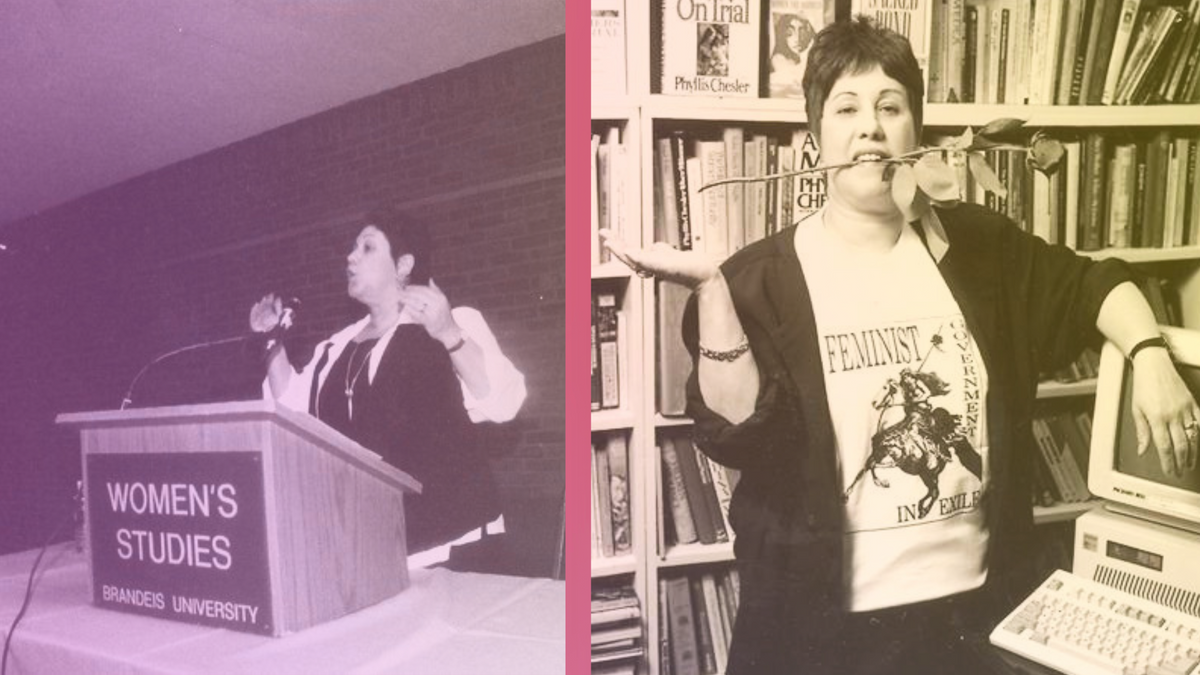I Wouldn’t Have Missed Our Feminist Revolution for the World
I remain forever loyal to that moment in time that set me free from my former life as a girl

Editor's Note: This is a copy of a speech delivered by Phyllis Chesler at the Women's Declaration International (WDI) USA national conference on 9/24/22, republished here with permission.
We now face the total disappearance of womankind both linguistically and as a biological reality; sex based rights have been trumped by gender identity rights; radical feminists who question the transgender phenomenon are shamed, censored, and dis-invited. This just happened to me. Women-only spaces are disappearing. Radical feminist positions on male violence, pornography, prostitution, and surrogacy are viewed as retrogressive. In the late 1960s, we helped women obtain “illegal” abortions—and, unbelievably, we may have to do so again.
Given this reality, these profound losses, I am almost ashamed to describe the optimistic days of the Second Wave. But here goes.
Perhaps the most important thing to tell you is that it was not hard for us to “come out,” as feminists, we had an opening in history. Almost everything we said and did was considered newsworthy. While this was a new experience— it did not mean that we had real power. We sounded the alarm but we did not manage to abolish rape, incest, sexual harassment, woman-battering, or trafficking. We were unable to prevent women from losing custody of children.
We pioneers emerged between 1963 and 1973 and took ideas very seriously. We did not all think alike. We were champion hairsplitters and disagreed with each other with searing passion.
The Second Wave consisted of three mighty bodies of water: In 1966, we formed a civil rights organization for women: the National Organization for Women, which brought class-action lawsuits and demonstrated against women’s legal, reproductive, political, and economic inequality.
Then (in the late 1960s), we picketed, marched, protested, sat in, and famously took over offices and buildings; joined consciousness-raising groups; learned about orgasms; organized Speak-outs; founded crisis hotlines and shelters for battered women; and came out as lesbians.
Finally, (and this is usually underestimated), we implemented feminist ideas within our professions and so began a process of transformation that continues to this day.
These were the three mighty tributaries of the second wave. I swam in all three.
“I had such an idealized view of feminist women that when I began to encounter incomprehensibly 'Mean Girl' behavior among us, I (we all were) stunned, blindsided.”
Without a feminist movement I would have had a career but not necessarily a calling; I still would have written my books, but they would have had much smaller audiences and far less impact.
It is crucial to understand that most of us knew nothing – absolutely nothing – about our feminist foremothers. In Women of Ideas and What Men Have Done to Them (1982), the divine Australian scholar Dale Spender documented how the most remarkable feminist work had been systematically disappeared again and again. Their writings were brilliant and fiery – but unknown to each successive generation.
Within ten to fifteen years, books by the best minds of my feminist generation were out of print. Within fifteen to twenty years, university professors and their students were largely unfamiliar with most of our work. They took for granted, or regarded as hopelessly old-fashioned, the grueling lawsuits we had brought, our academic writings, popular writings, and our brave activism – if, indeed, they remembered what we had done at all.
In our own lifetimes we became our suffragist grandmothers and shared their dusty, forgotten fate. Each generation of feminists had to reinvent the wheel. Some neutralized, watered down, and disappeared our ideas—and wrote in incomprehensible, Mandarin language.
The Second Wave was the first time in my life that I had ever experienced female solidarity based on ideas – and it was wondrous.
And yet: I had such an idealized view of feminist women that when I began to encounter incomprehensibly “Mean Girl” behavior among us, I (we all were) stunned, blindsided.
And, when we were slandered, shunned by everyone we knew, our history revised – we had no name for what was happening.
Eventually, we called some of this “trashing,” (Anselma Dell’Olio and Jo Freeman did) and it drove away many a good feminist. It never stopped me – nothing ever did – but it took its toll.
This means that my greatest comfort and strength came from doing the work itself – and from knowing that the work touched, changed, and even saved women’s lives.
I’ve been a soldier at war all my life, I carry scars; all warriors do.
It is inspiring that many of our Second Wave Western feminist ideas and ideals have been adopted, refined, and surpassed, globally by women’s groups. Today, there are women on every continent battling to abolish marital rape, woman battering, femicide, “eve teasing,” forced face-veiling, honor-based violence, honor killing, child marriage, polygamy, FGM, etc. Look at the brave women in Iran—as I said in 1971, we’d need a feminist air force and a feminist continent in order to rescue such protestors.
Most recently, for more than a year, I was part of a group of global activists who helped evacuate Afghan women and who organized food and medicine drops for those who still remain trapped behind Taliban lines. Doing so is a continuation of Second Wave style activism.
Despite everything, despite anything, I wouldn’t have missed this revolution, not for love or money. I remain forever loyal to that moment in time, that collective awakening that set me free from my former life as a girl. Allow me to paraphrase the most memorable speech Shakespeare gave King Henry V:
[She] that outlives this day, and comes safe home . . .
Then will [she] strip [her] sleeve and show [her] scars.
And say “These wounds I had. . . .”
This story shall the good [woman] teach [her children] . . .
From this day to the ending of the world,
But we in it shall be remember’d;
We few, we happy few, we band of [sisters];
For [she] to-day that sheds [her] blood with me
Shall be my [sister]; be [she] ne’er so vile,
This day shall gentle [her] condition:
And [gentlewomen everywhere] now a-bed
Shall think themselves accursed they were not here,
And hold their [humanity] cheap whiles any speaks
That fought with us. . . .
Three Rules:
- The measure of your success is the resistance you encounter. Embrace it.
- You can’t be a bystander without being complicit.
- We don’t need a room of our own. We need a very large continent of our own.
The generous support of our readers allows 4W to pay our all-female staff and over 50 writers across the globe for original articles and reporting you can’t find anywhere else. Like our work? Become a monthly donor!
Enter your email below to sign in or become a 4W member and join the conversation.
(Already did this? Try refreshing the page!)





Comments